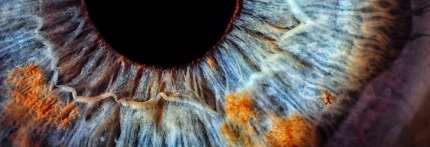If you look at the sun, your pupils become smaller to prevent eye damage. Researchers have now demonstrated that your pupils also become smaller if you look at an image of the sun. The research results appear to show that reflexes are unconsciously controlled by your understanding of what you see. Cognitive psychologist Marnix Naber, who did one year of research at Harvard University thanks to funding from NWO, published an article about his research on 20 May in the open access journal Journal of Vision.
Marnix Naber showed study subjects photos and cartoons of scenes with the sun and without the sun in the background. The photos and drawings were comparable in terms of brightness and had the same contrast between light and dark. Nevertheless the pupils of the study subjects were found to constrict more when they saw a photo or cartoon with a sun than a photo or cartoon without a sun.
Cognitive interpretation
Naber and his supervisor, professor Ken Nakayama, interpreted this pupil effect as a protection mechanism. 'Based on different characteristics, the brain rapidly recognises a sun as a sun,' explains Naber. 'This cognitive interpretation subsequently influences the pupil reflex. If a potentially harmful stimulus is shown, the visual brain system thinks that it must protect against excessive exposure to the stimulus.' The brain responds by making the pupil smaller, irrespective of whether it is the real sun or just an image of the sun.
Controlling the reflex
The researchers presented the sunny photos either normally or upside down. The upside-down photo made it difficult for the study subjects to see the image in its entirety and to recognise it. Showing the normal images of the sun reduced the size of the pupil, but the pupil scarcely responded to the upside-down images. This confirms the theory that the cognitive interpretation of the scene is important for the initiation of a reflex. The research also suggests that thoughts and cognition (such as observation and understanding) exert more control over reflexes than had previously been assumed.
Reading off Alzheimer's disease
The discovery that the pupil reflex is strongly linked to cognition could have important consequences for medical and psychological research. 'Disorders such as Alzheimer's disease have negative consequences for the cognition. It might well be the case that the pupils of Alzheimer's patients therefore respond differently to the sun (or images of the sun) than those of other people. In the future it might be possible to detect whether a person is suffering from Alzheimer's disease based on their pupil reflex in response to visual stimuli,' suggests Marnix. Follow-up research is needed to demonstrate whether the current method of measuring the pupil (pupillometry) is reliable enough for the discovery of brain disorders.
More information: From 20 May onwards the article can be consulted free of charge via www.journalofvision.org
Journal information: Journal of Vision





















